 Petzlover
Petzlover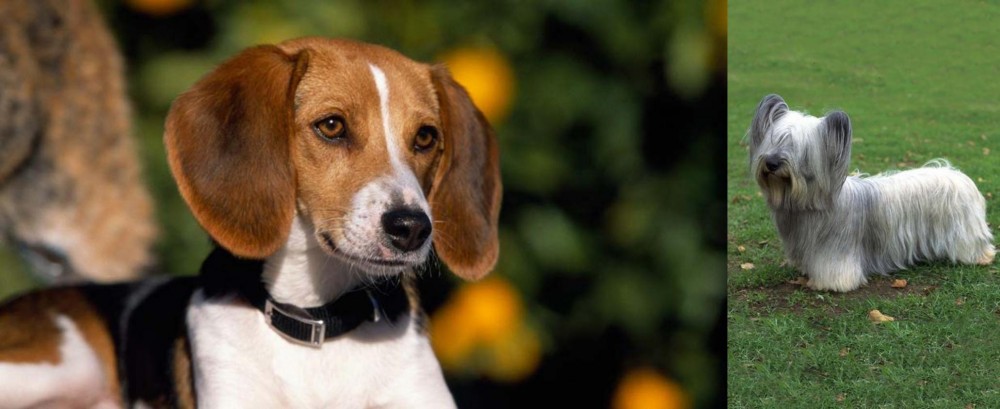 American Foxhound is originated from United States but Skye Terrier is originated from United Kingdom. American Foxhound may grow 38 cm / 15 inches higher than Skye Terrier. American Foxhound may weigh 14 kg / 31 pounds more than Skye Terrier. American Foxhound may live 3 years less than Skye Terrier. American Foxhound may have more litter size than Skye Terrier. American Foxhound requires Low Maintenance. But Skye Terrier requires Moderate Maintenance
American Foxhound is originated from United States but Skye Terrier is originated from United Kingdom. American Foxhound may grow 38 cm / 15 inches higher than Skye Terrier. American Foxhound may weigh 14 kg / 31 pounds more than Skye Terrier. American Foxhound may live 3 years less than Skye Terrier. American Foxhound may have more litter size than Skye Terrier. American Foxhound requires Low Maintenance. But Skye Terrier requires Moderate Maintenance
 As a cousin of the English Foxhound, the American Foxhound is a scent hound and bred for hunting. Robert Brooke brought the first hunting dogs to the colonies in 1650. These dogs were the starting point for several American hound breeds including the American Foxhound.
As a cousin of the English Foxhound, the American Foxhound is a scent hound and bred for hunting. Robert Brooke brought the first hunting dogs to the colonies in 1650. These dogs were the starting point for several American hound breeds including the American Foxhound.
For almost 300 years the Brooke family owned and bred dogs from this bloodline.
At the same time that Brooke was hunting with and breeding his hounds, George Washington was given French Foxhounds. These were crossed with the Brooke’s dogs to create the American Foxhound. This breed is said to have been originally bred in Virginia and Maryland.
They are the state dog of Virginia. After Red Foxes were imported or migrated, Irish Foxhounds were brought to American and added into the line, increasing the stamina and speed that today’s dog’s still display.
The American Foxhound was recognized by the American Kennel Club in 1886. Today’s American Foxhound presents in many different lines but are all considered the same breed even though some ay look very different. These strains include the Trigg, Walker, Penn-Marydel, Goodman, July and Calhoun.
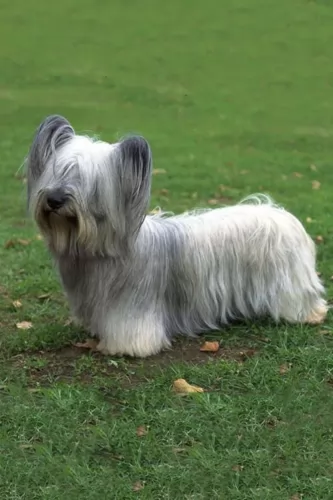 The Skye Terrier is a hardy dog breed and is actually considered to be an endangered native dog breed in the United Kingdom.
The Skye Terrier is a hardy dog breed and is actually considered to be an endangered native dog breed in the United Kingdom.
They were found on the Isle of Skye, although there is some confusion about its history. They were used long ago to hunt but these days they are essentially companion dogs.
They found their way to America and the Skye Terrier Club of America was founded in 1938. The American Kennel Club recognized the breed in 1887.
 Given the variety of bloodlines and strains mentioned above, there can be many differences in the American Foxhounds. Because of this most American Foxhounds bred to show are Walkers as they most closely fit the AKC Breed Standard.
Given the variety of bloodlines and strains mentioned above, there can be many differences in the American Foxhounds. Because of this most American Foxhounds bred to show are Walkers as they most closely fit the AKC Breed Standard.
In general, the American Foxhound has long, straight legs and is taller than the English Foxhound. They have a narrow chest and domed skull with a long muzzle.
They have low, wide set eyes that should be dark – brown or hazel, never blue. They have feet like a fox and laid-back shoulders with a curved tail. Athletic and muscled, the American Foxhound is bred to run. They are one of the rarest breeds in the United States.
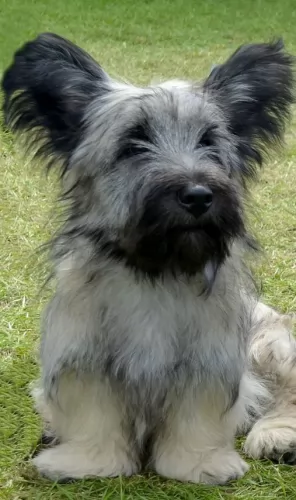 The Skye Terrier is a medium-sized dog standing at between 23 and 26cm in height and weighing between 12 and 18kg. The legs are short and sturdy. He is double coated with the top coat being straight and hard and forming a beard around the face area. The coat can be fawn, and in various shades of grey which are sometimes even black. The ears of the dog are medium sized and erect.
The Skye Terrier is a medium-sized dog standing at between 23 and 26cm in height and weighing between 12 and 18kg. The legs are short and sturdy. He is double coated with the top coat being straight and hard and forming a beard around the face area. The coat can be fawn, and in various shades of grey which are sometimes even black. The ears of the dog are medium sized and erect.
The Skye Terrier has always been a hunting dog and he enjoys quite a bit of exercise – walks, ball games as well as indoor games. Small though he may be, he is strong willed with a mind of his own and will benefit from being trained and socialized.
This is also necessary as he has a fairly reserved nature. He gets on well with children and makes an excellent family pet but he is ready to take on smaller pets in the home. He will bark when confronting strangers and makes an excellent watchdog too.
He is able to adapt well into life in the city or the countryside. He isn’t a dog to be left outside day after day and will just die of boredom, frustration and loneliness.
 With a reputation as a docile, sweet dog, the American Foxhound is great with kids and animals. They are gentle and often very shy with strangers. They are strong willed and stubborn especially when training them, so they are not a good first dog. They need an owner who has handled dogs before and knows how to be the pack leader without being angry or mean.
With a reputation as a docile, sweet dog, the American Foxhound is great with kids and animals. They are gentle and often very shy with strangers. They are strong willed and stubborn especially when training them, so they are not a good first dog. They need an owner who has handled dogs before and knows how to be the pack leader without being angry or mean.
The American Foxhound is a scent hound and once he is on the scent it is close to impossible to distract him from it. They have a tendency to ignore commands when they are in this state. A strong owner/leader is needed for this reason. Don’t let him off leash in an unfenced area.
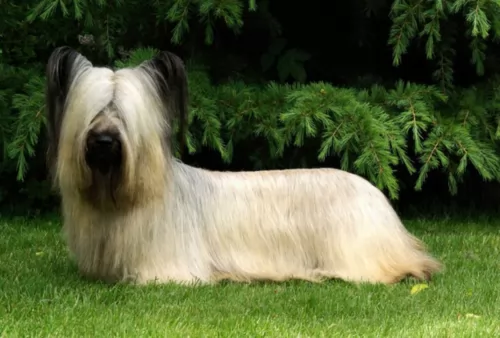 Give the Skye Terrier the attention he wants and he will reward you with his loving companionship.
Give the Skye Terrier the attention he wants and he will reward you with his loving companionship.
He loves the entire family but is best suited to homes where children have been taught to be kind to animals and to treat them with respect.
He has moderate energy levels and will expect you to give him a fair amount of exercise. The Skye Terrier can make an excellent companion for you and your family.
 The American Foxhound, like most hunting dogs does not carry a lot of genetic disorders. But they can easily become overweight and this can cause major problems. Dysplasia of any type had been mostly unknown in this breed, but due to obesity it is cropping up on occasion. Breeders have not, and do not usually screed for any genetic diseases.
The American Foxhound, like most hunting dogs does not carry a lot of genetic disorders. But they can easily become overweight and this can cause major problems. Dysplasia of any type had been mostly unknown in this breed, but due to obesity it is cropping up on occasion. Breeders have not, and do not usually screed for any genetic diseases.
The most devastating health issue the American Foxhound faces is thrombocytopathy. We will go into more detail on this in the Care for Pet section. This is a disease of the blood system, namely the platelets.
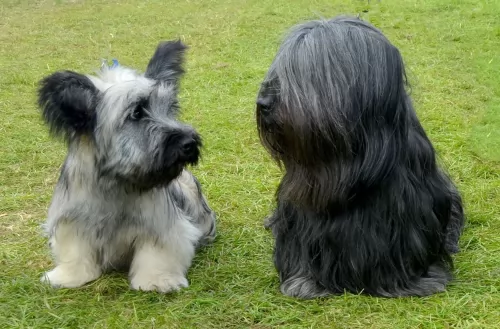 The Skye Terrier is a healthy dog breed. Perhaps the only issue that could be a problem with him is orthopedic problems. He is an achondroplastic dog, meaning a large body on small legs.
The Skye Terrier is a healthy dog breed. Perhaps the only issue that could be a problem with him is orthopedic problems. He is an achondroplastic dog, meaning a large body on small legs.
He could develop spinal problems if he were allowed to constantly be jumping off beds and high chairs.
Orthopedic problems affect the bones, muscles and joints and can actually be debilitating. Orthopedic conditions can be ligament tears or hip dysplasia for instance, accompanied by arthritis.
You’ll notice your dog has an abnormal way of walking or running, inability to get up once lying down and he may have arthritis and pain.Be careful because obesity can trigger problems with the joints and bones.
 Whether feeding a pup, or an adult American Foxhound, you need to be sure the food is high quality and that you don’t overfeed. The Foxhound is happy to eat as much as you give him. They like to eat. Make sure you measure and don’t free feed. Control what they are eating.
Whether feeding a pup, or an adult American Foxhound, you need to be sure the food is high quality and that you don’t overfeed. The Foxhound is happy to eat as much as you give him. They like to eat. Make sure you measure and don’t free feed. Control what they are eating.
For a puppy feed twice, a day – 2 to 3 cups of high quality puppy food. When he becomes an adult feed him once a day with 2 cups of adult food.
As mentioned previously, the American English Foxhound, like most of the hound breeds is a very healthy dog. They do not have many genetic health issues. They do have a risk for thrombocytopathy. This risk is slight, but all owners of American English Foxhounds should be aware of it.
This disease is a circulatory system disease with poorly or non-functioning platelets. Platelets are designed to assist in the control of bleeding and without functioning ones the dog can bleed excessively from just a minor cut or bleed internally from a minor injury. The disease can be treated but you have to notice it first. Depending on how severe the disease is, the treatment will vary. Some dogs will have to be given platelets.
This is a high energy breed that is very active and needs a lot of exercise. They are not good for the first-time owner as they are stubborn and hard to train. They need room to run and get frustrated and out of sorts if they don’t have it. They can live in the suburbs but only with a large fenced yard, an even larger dog park and regular walks. This dog needs a lot of exercise. The simplest thing to do is take him hunting.
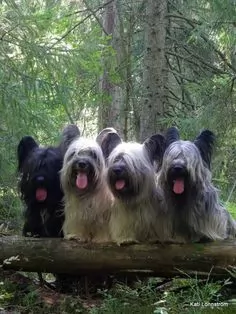 ● The coat of the Skye Terrier is long and silky and will most certainly require brushing every day if you keep the hair long. Such silky hair can easily become matted.
● The coat of the Skye Terrier is long and silky and will most certainly require brushing every day if you keep the hair long. Such silky hair can easily become matted.
● Little dogs like this will need their teeth being checked regularly. You can even try to buy special pet toothpaste and toothbrush and brush his teeth yourself. If you prefer, a professional dog groomer can do this for you and at the same time trim his nails and check his ears and clean the insides of the ears too to avoid infection.
● Provide him with top quality food as the quality of the dog food you buy makes a huge difference to his health and longevity. He is a small dog and there are some excellent commercially manufactured dog foods specially made for small, energetic dogs.
Try to include some home-made food for him which can be simply mixed into the dry kibble twice a week. Boiled chicken, brown rice or pasta and spinach, sweet potatoes and carrots is super tasty and nutritious. Ensure there is always a bowl of fresh, cool water within his reach.
● Keep his vaccines up to date against some deadly canine diseases, and get him to the vet when he shows signs of illness.